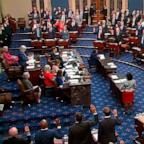George Will: Defending the Electoral College
W A S H I N G T O N, Nov. 2 -- Political hypochondriacs again are urging Americans tofear and be offended by the system of choosing presidents by electoralvotes.
Criticism of this system recurs whenever a close contest poses the possibility that a candidate might win an electoral vote victory while receiving fewer popular votes than his opponent. It is said, with more passion than precision, that this happened three times — 1824, 1876, 1888.
Even if that is true, it means that in 50 of 53 elections since 1789 — in 94 percent of elections, and in 27 consecutive elections — the system has not produced the outcome that troubles the sleep of its critics. Besides, the assertions about those elections can be true without being pertinent.
In 1824, before the emergence of the two-party system, all four candidates appeared on the ballots in only six of the 24 states. Six states, including New York, had no elections: their state legislatures picked the electors. Nationally, only about 350,000 of the 4 million eligible white males voted. Andrew Jackson received 38,149 more votes than John Quincy Adams, but neither received a majority of electoral votes. So the House of Representatives decided, picking Adams. In 1888 fraud on both sides may have involved more votes than the victory margin (90,596).
There never has been an Electoral College victory by a candidate who lost the popular vote by a substantial margin. And only simple-minded majoritarianism holds that “the nation’s will” would be “frustrated” and democracy “subverted” (this is the language of Electoral College abolitionists) were an electoral vote majority to go to a candidate who comes in a close second in the popular vote count. In such a case, the framers’ objective — a president chosen through state-by-state decisions — would be achieved.
System Ensures National Campaigns
The Electoral College has evolved, shaping and being shaped by the two-party system, which probably would not survive abandonment of winner-take-all allocation of electoral votes. Direct popular election of presidents, or proportional allocation of states’ electoral votes, would incite minor parties to fractionate the electorate. This might necessitate runoff elections to guarantee that the eventual president got at least 40 percent of the vote — and runoffs might become auctions in which minor parties sold their support.




